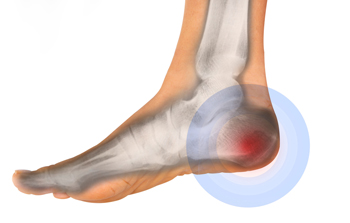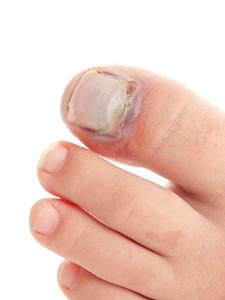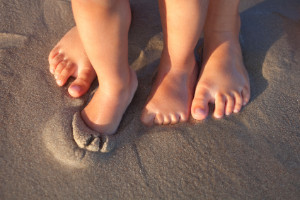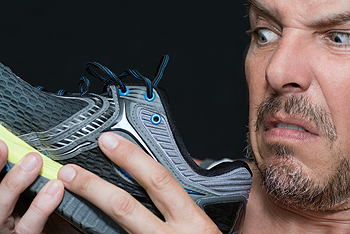Freehold (732) 294-9393
Freehold (732) 294-9393
 There are many people who endure some type of heel pain at least once in their lives. This may appear in the form of specific foot conditions which may include plantar fasciitis, Achilles tendonitis, sprains and fractures. There may be simple measures that can be implemented to reduce a portion of the pain and discomfort that is associated with heel pain, including wearing shoes that fit properly, using inserts in the heel area of the shoe which may aid in providing additional cushioning, or wearing a splint while you sleep. This may help to stretch the foot while sleeping occurs. If you are experiencing any form of heel pain, it is advised to speak with a podiatrist who can determine the cause, and offer correct treatment techniques.
There are many people who endure some type of heel pain at least once in their lives. This may appear in the form of specific foot conditions which may include plantar fasciitis, Achilles tendonitis, sprains and fractures. There may be simple measures that can be implemented to reduce a portion of the pain and discomfort that is associated with heel pain, including wearing shoes that fit properly, using inserts in the heel area of the shoe which may aid in providing additional cushioning, or wearing a splint while you sleep. This may help to stretch the foot while sleeping occurs. If you are experiencing any form of heel pain, it is advised to speak with a podiatrist who can determine the cause, and offer correct treatment techniques.
Many people suffer from bouts of heel pain. For more information, contact Dr. Henry Miller of New Jersey. Our doctor can provide the care you need to keep you pain-free and on your feet.
Causes of Heel Pain
Heel pain is often associated with plantar fasciitis. The plantar fascia is a band of tissues that extends along the bottom of the foot. A rip or tear in this ligament can cause inflammation of the tissue.
Achilles tendonitis is another cause of heel pain. Inflammation of the Achilles tendon will cause pain from fractures and muscle tearing. Lack of flexibility is also another symptom.
Heel spurs are another cause of pain. When the tissues of the plantar fascia undergo a great deal of stress, it can lead to ligament separation from the heel bone, causing heel spurs.
Why Might Heel Pain Occur?
Treatments
Heel pain should be treated as soon as possible for immediate results. Keeping your feet in a stress-free environment will help. If you suffer from Achilles tendonitis or plantar fasciitis, applying ice will reduce the swelling. Stretching before an exercise like running will help the muscles. Using all these tips will help make heel pain a condition of the past.
If you have any questions please contact our office located in Freehold, NJ . We offer the newest diagnostic and treatment technologies for all your foot and ankle needs.
 Morton’s neuroma is a common nerve issue in the ball of the foot caused by the pinching or trapping of a nerve. This can happen over time by performing simple tasks such as wearing heels regularly. This condition can cause extreme discomfort and pain similar to carpal tunnel syndrome. There are many ways to treat this without surgery, but in some cases, surgery is necessary in order to fix the problem. Previously, the only surgical method for treating Morton’s neuroma was to cut and remove the troubled nerve. Unfortunately, sometimes the removal of the nerve leads to pain or discomfort similar to what the patient was facing before the surgery. Thankfully, there have been advances in the way this surgery is handled. Performing an endoscopic release of the ligament trapping the nerve is becoming more popular. This method is minimally invasive, and the recovery period is much easier, along with being mostly pain-free. If you have pain or discomfort in the ball of your foot, it would be in your best interest to schedule an appointment with a podiatrist to receive the appropriate treatment.
Morton’s neuroma is a common nerve issue in the ball of the foot caused by the pinching or trapping of a nerve. This can happen over time by performing simple tasks such as wearing heels regularly. This condition can cause extreme discomfort and pain similar to carpal tunnel syndrome. There are many ways to treat this without surgery, but in some cases, surgery is necessary in order to fix the problem. Previously, the only surgical method for treating Morton’s neuroma was to cut and remove the troubled nerve. Unfortunately, sometimes the removal of the nerve leads to pain or discomfort similar to what the patient was facing before the surgery. Thankfully, there have been advances in the way this surgery is handled. Performing an endoscopic release of the ligament trapping the nerve is becoming more popular. This method is minimally invasive, and the recovery period is much easier, along with being mostly pain-free. If you have pain or discomfort in the ball of your foot, it would be in your best interest to schedule an appointment with a podiatrist to receive the appropriate treatment.
Morton’s neuroma is a very uncomfortable condition to live with. If you think you have Morton’s neuroma, contact Dr. Henry Miller of New Jersey. Our doctor will attend to all of your foot care needs and answer any of your related questions.
Morton’s Neuroma
Morton's neuroma is a painful foot condition that commonly affects the areas between the second and third or third and fourth toe, although other areas of the foot are also susceptible. Morton’s neuroma is caused by an inflamed nerve in the foot that is being squeezed and aggravated by surrounding bones.
What Increases the Chances of Having Morton’s Neuroma?
Morton’s neuroma is a very treatable condition. Orthotics and shoe inserts can often be used to alleviate the pain on the forefront of the feet. In more severe cases, corticosteroids can also be prescribed. In order to figure out the best treatment for your neuroma, it’s recommended to seek the care of a podiatrist who can diagnose your condition and provide different treatment options.
If you have any questions, please feel free to contact our office located in Freehold, NJ . We offer the newest diagnostic and treatment technologies for all your foot care needs.
 There are several ways a broken toe can happen. These may include a sudden fracture by dropping a heavy object on your toes, stubbing your toe, or having a stress fracture gradually occur. Noticeable symptoms of a broken toe may include severe pain, discomfort, swelling, and many patients may see signs of bruising beginning to appear. In severe fractures, the toe may look crooked, and the ability to walk may be hindered. Once a proper diagnosis confirms the toe is broken, which typically happens when an X-ray is performed, the correct course of treatment can commence. It may be beneficial to elevate your foot, and this may aid in reducing a portion of the swelling, in addition to wearing a shoe with a stiff sole that can provide maximum support. If you have broken your toe, it is suggested that you speak to a podiatrist who can properly guide you through the healing process.
There are several ways a broken toe can happen. These may include a sudden fracture by dropping a heavy object on your toes, stubbing your toe, or having a stress fracture gradually occur. Noticeable symptoms of a broken toe may include severe pain, discomfort, swelling, and many patients may see signs of bruising beginning to appear. In severe fractures, the toe may look crooked, and the ability to walk may be hindered. Once a proper diagnosis confirms the toe is broken, which typically happens when an X-ray is performed, the correct course of treatment can commence. It may be beneficial to elevate your foot, and this may aid in reducing a portion of the swelling, in addition to wearing a shoe with a stiff sole that can provide maximum support. If you have broken your toe, it is suggested that you speak to a podiatrist who can properly guide you through the healing process.
A broken toe can be very painful and lead to complications if not properly fixed. If you have any concerns about your feet, contact Dr. Henry Miller from New Jersey. Our doctor will treat your foot and ankle needs.
What to Know About a Broken Toe
Although most people try to avoid foot trauma such as banging, stubbing, or dropping heavy objects on their feet, the unfortunate fact is that it is a common occurrence. Given the fact that toes are positioned in front of the feet, they typically sustain the brunt of such trauma. When trauma occurs to a toe, the result can be a painful break (fracture).
Symptoms of a Broken Toe
Generally, it is best to stay off of the injured toe with the affected foot elevated.
Severe toe fractures may be treated with a splint, cast, and in some cases, minor surgery. Due to its position and the pressure it endures with daily activity, future complications can occur if the big toe is not properly treated.
If you have any questions please feel free to contact our office located in Freehold, NJ . We offer the newest diagnostic and treatment technologies for all your foot and ankle needs.
 When babies are born, the tendons, joints, and bones are flexible, and this will typically result in children having flat feet until they are older. It may be beneficial to periodically have your child’s feet checked, which may ensure they are developing correctly. Research has shown the foot is comprised of 26 bones and that walking barefoot may aid in the proper development of strong bones and muscles. Wearing socks are beneficial in keeping the feet warm, and a good fit occurs when the socks are one quarter of an inch longer than the biggest toe. The importance of choosing the right size shoe is crucial in possibly preventing uncomfortable foot conditions from developing. It may be helpful to know that a sturdy shoe may be the best choice for this early stage of foot development, in addition to choosing leather soles, which may aid in traction. If you would like additional information about other forms of maintaining good foot health for your child, it is advised to speak with a podiatrist.
When babies are born, the tendons, joints, and bones are flexible, and this will typically result in children having flat feet until they are older. It may be beneficial to periodically have your child’s feet checked, which may ensure they are developing correctly. Research has shown the foot is comprised of 26 bones and that walking barefoot may aid in the proper development of strong bones and muscles. Wearing socks are beneficial in keeping the feet warm, and a good fit occurs when the socks are one quarter of an inch longer than the biggest toe. The importance of choosing the right size shoe is crucial in possibly preventing uncomfortable foot conditions from developing. It may be helpful to know that a sturdy shoe may be the best choice for this early stage of foot development, in addition to choosing leather soles, which may aid in traction. If you would like additional information about other forms of maintaining good foot health for your child, it is advised to speak with a podiatrist.
Making sure that your children maintain good foot health is very important as they grow. If you have any questions, contact Dr. Henry Miller of New Jersey. Our doctor can provide the care you need to keep you pain-free and on your feet.
Keeping Children's Feet Healthy
Having healthy feet during childhood can help prevent medical problems later in life, namely in the back and legs. As children grow, their feet require different types of care. Here are some things to consider...
Although babies do not walk yet, it is still very important to take care of their feet.
Avoid putting tight shoes or socks on his or her feet.
Allow the baby to stretch and kick his or her feet to feel comfortable.
As a toddler, kids are now on the move and begin to develop differently. At this age, toddlers are getting a feel for walking, so don’t be alarmed if your toddler is unsteady or ‘walks funny’.
As your child gets older, it is important to teach them how to take care of their feet.
Show them proper hygiene to prevent infections such as fungus.
Be watchful for any pain or injury.
Have all injuries checked by a doctor as soon as possible.
Comfortable, protective shoes should always be worn, especially at play.
If you have any questions please feel free to contact our office located in Freehold, NJ . We offer the newest diagnostic and treatment technologies for all your foot and ankle needs.
Read more about How to Care for Your Child's Feet If your feet sweat often and excessively, you may have a condition that is referred to as plantar hyperhidrosis. Patients who are afflicted with this condition may notice their shoes and socks are wet and soggy the majority of the time, in addition to leaving damp imprints of their feet as a result of the excess moisture. Patients who are afflicted with this condition may find moderate relief by wearing shoe inserts daily, which may help in absorbing moisture. Many patients may find it advantageous to use powder in their socks, and this may aid in soaking up any excess moisture. Additionally, drying your shoes out at the end of the day may aid eliminating a portion of the sweat that has accumulated. If you suffer from plantar hyperhidrosis, it is suggested to speak with a podiatrist who can inform you of correct treatment options.
If your feet sweat often and excessively, you may have a condition that is referred to as plantar hyperhidrosis. Patients who are afflicted with this condition may notice their shoes and socks are wet and soggy the majority of the time, in addition to leaving damp imprints of their feet as a result of the excess moisture. Patients who are afflicted with this condition may find moderate relief by wearing shoe inserts daily, which may help in absorbing moisture. Many patients may find it advantageous to use powder in their socks, and this may aid in soaking up any excess moisture. Additionally, drying your shoes out at the end of the day may aid eliminating a portion of the sweat that has accumulated. If you suffer from plantar hyperhidrosis, it is suggested to speak with a podiatrist who can inform you of correct treatment options.
If you are suffering from hyperhidrosis contact Dr. Henry Miller of New Jersey. Our doctor can provide the care you need to attend to all of your foot and ankle needs.
Hyperhidrosis of the Feet
Hyperhidrosis is a rare disorder that can cause people to have excessive sweating of their feet. This can usually occur all on its own without rigorous activity involved. People who suffer from hyperhidrosis may also experience sweaty palms.
Although it is said that sweating is a healthy process meant to cool down the body temperature and to maintain a proper internal temperature, hyperhidrosis may prove to be a huge hindrance on a person’s everyday life.
Plantar hyperhidrosis is considered to be the main form of hyperhidrosis. Secondary hyperhidrosis can refer to sweating that occurs in areas other than the feet or hands and armpits. Often this may be a sign of it being related to another medical condition such as menopause, hyperthyroidism and even Parkinson’s disease.
In order to alleviate this condition, it is important to see your doctor so that they may prescribe the necessary medications so that you can begin to live a normal life again. If this is left untreated, it is said that it will persist throughout an individual’s life.
A last resort approach would be surgery, but it is best to speak with your doctor to find out what may be the best treatment for you.
If you have any questions please feel free to contact our office located in Freehold, NJ . We offer the newest diagnostic and treatment technologies for all your foot and ankle needs.